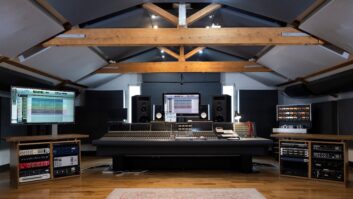
Anyone with the drive and dollars can get an audio education today, and this is relatively new. There have been a handful of dedicated audio training programs around for 20 years or more, but the majority of them (and there are plenty) have popped up just recently. There are associate’s, bachelor’s and master’s degrees from community colleges and four-year universities and trade and tech schools with or without a degree. There are intensive conservatory-types that integrate music curricula and there are studios that offer nighttime workshops. Some schools let you pick your classes or programs in a mix-and-match format, while others are all-in—no à la carte. While all schools have their Cinderella student stories, 99 percent of grads will start at entry level, and there is nothing wrong with that.
advertisement
Over the years I’ve taught at three of the types of schools mentioned. I’ve been director of education and an instructor at the Conservatory of Recording Arts for more than 10 years (trade and tech); I have been an adjunct professor at Belmont University in Nashville (traditional college) and taught at the Danish Rhythmic Music Conservatory in Copenhagen (certificate/performance). My experience has made it clear to me that this business of audio education (and yes, it is a business) includes some truths that may be startling to prospective students and parents.
The most important factors in getting a job involve skills that you bring with you to school. This doesn’t mean you have to know the difference between line, mic and instrument level or the quick key for consolidating audio in your DAW; you’ll learn that in school. The chips you need to bring to this game are more basic. Can you perform a menial task without showing attitude? Do you smile often? Can you stay awake? Do you look people in the eye when you speak with them? Are you pleasant to be around? How’s your appearance? Can you organize, study and learn complex material? Are you a chronic texter? Are you a self-starter, constantly looking for things to do when none have been assigned? Truth: Incompatible personality and lack of work ethic are the biggest complaints from both teachers and employers across the country.
Social media can kill your prospects. We’ve all read in the news about the Wall Street firm that rejected a potential employee because of a questionable party photo on Facebook. Well, a top studio in New York just passed on a student intern because of what they saw when they Googled him. Employers are going to check you out. Count on it. Truth: If you want a job, clean up your e-trail; you won’t get a second chance.
Your attitude is more important than your education. Sounds odd coming from a teacher, I know, but less often than I’d like, a student or students come along who make me think, “This person would be successful no matter what.” I’m teaching two students now who are sharp, interesting to converse with, always willing to take on something new, and very smart. I’d hire them in a heartbeat. I wouldn’t care if they knew anything at all about audio. I could train them and they’d be awesome. The best part? They don’t act like they know what they know. They operate at a high level but are humble and willing to learn. Truth: You don’t have to be a superhero to be successful, just engaged and easy to be around in a windowless room for eight hours or more.
You probably won’t end up doing what you envision. Job availability, competition, the economy, changes in the industry—these are all things you have no control over. But you can start down the right path by having the basics covered that are under your control: Location, transportation, money to support yourself and a career plan, even a rough one. If this means having a non-audio job for a while, then do it. Truth: Not going where the work is will kill your career. You’ve just bought your education, now use it in a place where you can find work. If that means going back to your hometown, make sure there is opportunity; if there isn’t, go where the work is!
Competition is fierce. All the schools are graduating people wanting the same job as you. You’ve moved to the place with the jobs, now what? If you want to compete, offer an employer more than is expected, make yourself valuable. Service and attitude first; they expect you to know technology. Have a plan to set yourself up for the long haul, and don’t give up. Truth: I run across many students who have no plan for their end game or move to a city and give up because they’re not doing what they want, even after a short time. Arm yourself with the truth: Most of what you can do to build your career is under your control. Don’t buy your own excuses. Business sucks? It sucks everywhere. No money? Get a job and network until your gig comes along. Life is tough? Everyone has challenges. This is a tech column and I’ve not mentioned technology at all. Of course it’s important. Knowing gear, signal flow, computer and DAW operation and basic audio concepts are foundational. But frankly, at the entry level, attitude is more important. You’ve chosen a career with great possibilities and potential for creative freedom, now work it and don’t give up.







